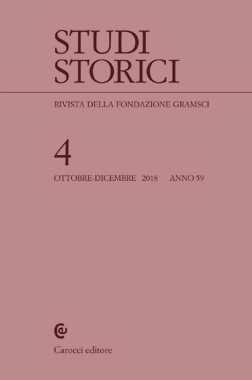
luglio - settembre 2010 anno 51
Sommario e abstract degli articoli
Giuliano Procacci storico
Giuliano Procacci storico
Elena Fasano Guarini, pp. 521-538
Ancora su Giuliano Procacci «modernista»
Procacci’s studies on the Modern Age
In this contribution the author partially revises her readings, presented on previous occasions, of Giuliano Procacci’s works on early modern history. She identifies as a specific feature of Procacci’s scholarly profile the co-existence of a two-pronged interest: on the one hand (especially at the beginning of his career) towards Italy and Europe in early modern times, and, on the other – and with the passage of time, this becomes prevalent – towards contemporary history. As concerns Procacci the «modernist», the author examines his works on Machiavelli and the first part of his Storia degli italiani; in the overall development of the latter, she underscores Procacci’s attention to the long term historical processes which characterise the life of nations.
Michele Ciliberto, pp. 539-555
Procacci interprete di Machiavelli
Procacci’s interpretation of Machiavelli
The aim of this essay is to outline the main features of Procacci’s interpretation of Machiavelli: first, his intentional disengagement from certain ideological readings of the Secretary’s works which were widespread in Italy in the period between World War I and the Fascist era. Second, his re-evaluation of the unity of Machiavelli’s thought, against the traditional and outdated contrast between The Prince and the Discourses on Livy. Third, his portrait of Machiavelli as a key player in modern culture and civilization. Within this framework, the essay also sets out to highlight some characteristics of Procacci’s approach which, in light of recent scholarship on Machiavelli and on Humanistic and Renaissance thought, now appear as shortcomings.
David Bidussa, pp. 557-571
Giuliano Procacci e la storia contemporanea in Italia come disciplina (1952-1966)
Giuliano Procacci and the making of Contemporary History as a discipline in Italy (1952-1966)
The development of contemporary historiography in Italy after World War II was a consequence of two different elements: a) the formation of documentary centre on the history of social and political movements in the modern and contemporary ages; b) and the making of a generation of historians, devoted to early modern history and involved in methodological and intellectual history in the social sciences. Giuliano Procacci was a typical representative of both these elements. His work as scientific director at Istituto Giangiacomo Feltrinelli in 1956-1962 was to widen his sphere of historical research. The organisation ofIstituto Giangiacomo Feltrinelli as an international historical centre devoted to economic and social history, under his scientific management, marked the beginning of Contemporary History in Italian historiography.
Andrea Panaccione, pp. 573-585
Giuliano Procacci: la storia del movimento operaio
Giuliano Procacci: the history of the labour movement
The works by Giuliano Procacci concerning the history of the labour movement – from the period and issues of the Second International Age to socialism and communism in Europe between the World Wars; from the Italian labour movement, its forms of organization and geography, to the international impact of the developments in the Soviet Union – present an important approach and make an internationally acknowledged contribution, from the methodological viewpoint as well, to this kind of historiography. But they also lay the groundwork for a more comprehensive and globally oriented investigation in the contemporary world, its different protagonists, and its interdependences. The questions raised by the historian Procacci are those of a changing history in a changing world.
Antonello Venturi, pp. 587-601
Procacci e l’Unione Sovietica
Procacci and the Soviet Union
In 1974, Procacci published his Il partito nell’Unione Sovietica, 1917-1945 – a book issuing from a long period of intellectual and political queries. It is a text rich in unspoken questions, particularly on the resounding success of one-party systems in European and world history, and the historical significance of Jacobinism. In fact, Procacci used this concept in very different ways, taking it alternately from Mathiez to Lenin, Gramsci to Giuseppe Berti. Today, although his text can hardly be considered a viable contribution to the history of the Soviet Union, it is still an interesting document in twentieth-century Italian intellectual history.
Roberto Finzi, pp. 603-620
Partigianeria e partigianeria legittima: a proposito di «Il fascismo e la razza» di Giorgio Israel
Partisanship and legitimate partisanship: on Giorgio Israel’s Il fascismo e la razza
Israel’s essay reviewed by Finzi (Bologna, Il Mulino, 2010) is a book on an important topic that largely incorporates the earlier volume by Israel and Nastasi, Scienza e razza nell’Italia fascista (Bologna, Il Mulino, 1998). Finzi points out that Israel’s essay is essentially a long pamphlet in which the author, to support his preconceived ideas, uses heavily selected bibliography and historical data, and in some cases even falsifies events well known to historians. In short – to use a categorization illustrated by Eric Hobsbawm many years ago – this is a case of «illegitimate partisanship».
Nicola Tranfaglia, pp. 621-649
La Repubblica sociale italiana e la deportazione dall’Italia (1943-1945)
The Italian Social Republic and the deportation from Italy (1943-1945)
This article examines the role of the Italian Social Republic (Repubblica sociale italiana, Rsi) – established by Mussolini in northern Italy in September 1943, after the fall of the Fascist Regime in July – in the most cruel crime committed by the European fascisms during World War II: the massacre of Jews, members of ethnic minorities, political opponents, and others in the concentration camp system throughout Europe. In collaboration with Brunello Mantelli, the author is responsible for a research project, sponsored by the University of Torino, on deportation during World War II. The article focuses special attention on the issues of the deportation of Jews and political opponents from Italy, and the organization of the Italian camps.
Laura Demofonti, pp. 651-689
Il movimento sportivo cattolico in Italia fra Ottocento e Novecento
The Catholic sports movement in Italy from the nineteenth to the twentieth centuries
The relationship between Church and sport is less unusual than it might seem. This essay reconstructs the story of the encounter between sport and the Catholic world and, in particular, highlights the role played by the Church, which early on grasped sports’ potential as a means rather than an end. Catholic sport was born around the middle of the nineteenth century as an activity developed by church youth centres. At the beginning, sport was merely considered a form of entertainment useful to keep young people from spending their leisure time in a variety of «improper» ways. Soon, however, starting from the pontificate of Leo XIII, it acquired strategic value under the project of the Christian re-conquest of society; eventually, during the Fascist period, it became a tool to claim a hegemonic role for the Church in the education of youth.
Elio Cerrito, pp. 691-797
I poli di sviluppo nel Mezzogiorno. Per una prospettiva storica
Growth poles in the Mezzogiorno. Towards a historical perspective
The essay reviews the literature on Italy’s «growth poles» policy in the 1950s-1980s. The first part discusses the 4th Siderurgical Center and the opening of the Alfasud car plant, while the second part summarizes the rationale, the limits, and the successes of the Italian experience with growth poles, providing extensive notes on the chemical poles. Although Italian poles’ policy limits are well known, their successes have scarcely been mentioned. Three main results emerge: a) many large, profitable plants have been stably embedded in the Southern economy; b) the growth poles have proven to be vital and capable of significantly increasing incomes in the areas where they have been established and of stably attracting investments; c) in some cases the poles have induced the start-up and development of new firms.
Sfoglia gli altri numeri dell’anno 51 / 2010
Elenco dei fascicoli pubblicati dal 2010
Seleziona fascicolo...
- anno 65 / 2024
- 1
- 2
- anno 64 / 2023
- 1
- 2
- 3
- 4
- anno 63 / 2022
- 1
- 2
- 3
- 4
- anno 62 / 2021
- 1
- 2
- 3
- 4
- anno 61 / 2020
- 1
- 2
- 3
- 4
- anno 60 / 2019
- 1
- 2
- 3
- 4
- anno 59 / 2018
- 1
- 2
- 3
- 4
- anno 58 / 2017
- 1
- 2
- 3
- 4
- anno 57 / 2016
- 1
- 2
- 3
- 4
- anno 56 / 2015
- 1
- 2
- 3
- 4
- anno 55 / 2014
- 1
- 2
- 3
- 4
- anno 54 / 2013
- 1
- 2
- 3
- 4
- anno 53 / 2012
- 1
- 2
- 3
- 4
- anno 52 / 2011
- 1
- 2
- 3
- 4
- anno 51 / 2010
- 1
- 2
- 3
- 4
